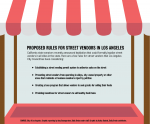A new bill could allow street vendors to peddle their goods across California.
Senate Bill 946, proposed by state Sen. Ricardo Lara, would require cities to create a permitting process for street vendors to legally sell their goods. The bill would also prohibit nongovernmental institutions, such as brick-and-mortar businesses, from requiring street vendors to seek their permission before operating.
If the bill passes, it would prevent cities from restricting the number of permits given to street vendors unless there is a concern for public health or welfare, and cannot unreasonably restrict vendors to certain areas.
Michael Soller, a spokesperson for Lara, said the bill is not meant to act as a statewide street vending permit, but as a means for vendors to apply for a permit to operate legally.
“(Cities) need to set a permitting process to give people a pathway to become legal and eventually be self-sufficient,” he said. “That’s the goal of the bill … to encourage cities to take that next step.”
Los Angeles currently does not regulate street vending but the practice is decriminalized, which means vendors can be cited but not criminally convicted. However, the city has considered certain regulations in November, including creating a permitting system for street vendors.
The city has also considered requiring vendors to operate at certain distances away from storefronts, historical monuments or parking spaces, and limiting vending carts to two per block, according to a 2017 report from the city’s chief legislative analyst.
Andrew Thomas, the executive director of the Westwood Village Improvement Association, said he would like to see the bill allow neighborhoods to decide for themselves if they want to permit street vending. He added he does not think Westwood benefits from street vendors because they do not pay the same taxes as business owners and compete with existing businesses that already serve a multitude of food options.
“If they wanted it, they (could) say, ‘OK, this is something we’d like to see in our community,'” he said. “It would be important, I think, for cities to have some way to regulate sidewalk vending so it can be done in a way that can be compatible with the commercial districts.”
Thomas said he thinks areas of Los Angeles that do not have many food options could potentially benefit from street vendors. He added he would like to see the city require food products sold by street vendors be approved by the county health department and that vendors dispose of any waste generated by their businesses.
Soller said he thinks vendors make streets more vibrant and added he thinks they are culturally important to California’s communities.
“Sidewalk culture benefits businesses, (vendors) bring people to neighborhoods, they benefit public safety – having people on the street (and) eyes on the street,” he said. “Creating opportunities for people to have their businesses … is going to create all kind of opportunities for students, for families, for shoppers.”
Marcos Osorio, a street vendor in Westwood, said he thinks the fear of a citation threatens his business but added he feels he is part of the Westwood community. He said he enjoys working in Westwood because his customers are kind.
Soller said he thinks President Donald Trump’s administration’s stance on immigration makes legalizing street vending an urgent issue. The Trump administration issued an executive order last year that would prioritize deporting undocumented individuals with a perceived history of criminal acts.
“With the Trump administration targeting undocumented people indiscriminately, this (issue) is even more important because even a ticket for sidewalk vending can lead to someone being at risk of deportation, at risk for some to lose their livelihood,” he said.
